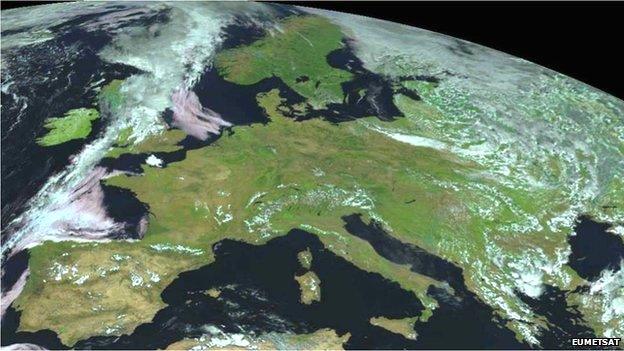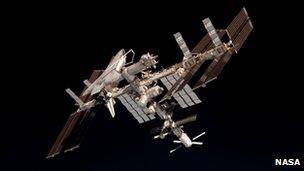Ministers to define Europe's goals in space
- Published

Space activity is considered a good bet for economic growth across Europe
Member states of the European Space Agency (Esa) are meeting in Italy to determine the organisation’s programmes and budgets for the next five years.
The Naples agenda, external covers some 12bn euros' worth of activities.
Projects up for debate include Europe's continued participation in the space station and the development of a major new weather satellite system.
A plan also needs to be devised to maintain the competitiveness of Europe's big rocket - the Ariane 5.
Although this vehicle currently dominates the commercial satellite launch market, it is facing increased competition, especially from the US, where a new rocket developed by the Californian SpaceX company is undercutting Ariane sharply on price.
The research ministers from the 20 Esa nations will endeavour to come away from Naples with clear policies to enhance the European launcher’s future prospects.
These will probably involve upgrading the existing rocket with a more powerful upper-stage whilst at the same time laying down a firm development programme for a next generation rocket that benefits from substantially reduced production costs.
Fourfold promise
Esa’s Council at Ministerial Level was last held in 2008 in The Hague, Netherlands. That meeting agreed a 10bn-euro activity plan. But that was before the Eurozone crisis, and the intervening years have seen a number of member states struggle to fulfil their Dutch promises.

Decisions need to be made about the space station
Agency officials, mindful of the ongoing difficulties in some European capitals, have therefore proposed a broadly flat budget scenario. Countries will be keen to participate where they can because of the returns to their home economies that usually result from Esa investment.
Indeed, so keen is the UK to drive this multiplier that it is actually lifting its Esa subscription by 25-30%.
"Growth is our top priority and we're focussing our investment [at the Naples meeting] on the areas where we think we can get at least a four-to-one return for extra business investment," the British science minister David Willetts said.
"We reckon that if we have a budget of about a quarter of a billion pounds a year, we get at least a billion pounds a year of commercial business investment in the UK as a result," he told the BBC.
In addition to the Ariane issue, key programmes that need to be signed off include:
Science: Esa membership covers a mandatory and an optional subscription. The science programme falls into the former category. Everyone must contribute a sum that reflects the relative size of their economy. This sees Germany, followed by the UK, contribute most. The new budget will help implement a number of missions just approved, such as a telescope to study the Universe’s mysterious expansion force known as “dark energy” and an ambitious venture to send a probe inside the orbit of Mercury to study the Sun.
Meteorology: Esa carries out the R&D work on Europe’s weather satellites. The most important of these spacecraft to forecasting are the polar orbiting platforms called Metop. The current batch is due to operate until the end of the decade, but the follow-on system must be approved now if it is to be ready to launch in 2020 and avoid any data gaps. Metop Second Generation will attract substantial interest from the “big two” in Esa – France and Germany – but the UK is also keen to play a significant role.
Space Station: The ISS is one of the biggest ticket items on the agenda. Ministers not only have to find the money to cover European operating costs, they also have to approve their non-cash contribution to the orbiting platform. Currently, this takes the form of regular cargo deliveries using a huge space truck called the ATV. But the vehicle’s production is ending and the Americans would like Europe to meet its obligations by making a propulsion unit that could drive Nasa’s new manned capsule, Orion, through space.
Earth Observation: Europe has positioned itself to be the leading bloc in the study of the planet from space. It is building a fleet of satellites called the Sentinels to acquire fundamental data about Earth processes, and another series of spacecraft that seek to address particular environmental questions using some very innovative observation techniques. The next phases of both projects will be agreed in Naples.
Telecommunications: While astronauts may grab the media limelight, satellite communications is a more real reflection of what space activity is about. The manufacture and exploitation of these "satcoms" employs tens of thousands of people across Europe. Esa funds R&D to help maintain the competitiveness of European companies’ products. This meeting, for example, will approve research on the development of a next generation platform, or Neosat as it has been dubbed, which will become the baseline design for the satcoms Europe sells around the world.
The European Union: Esa and the EU are distinct legal entities, but the importance of space systems to the European economy means Brussels believes it should have a significant interest in the policies that are enacted within the EU bloc. Brussels has been using Esa as a kind of technical agent to help it procure and run space systems, the most prominent of which is the Galileo satellite navigation network. But Esa and the EU run under different rules and their relationship has to be formalised. A resolution to that effect will be approved at the Naples meeting.
Esa has its origins in a 1960s project to develop a European rocket. The six nations involved in the European Launcher Development Organisation (Eldo) have since grown into a 20-nation grouping. Poland, the newest member, was welcomed into the fold on Monday.
Jonathan.Amos-INTERNET@bbc.co.uk and follow me on Twitter: @BBCAmos, external
- Published19 November 2012
- Published9 November 2012
- Published9 November 2012
- Published25 June 2011